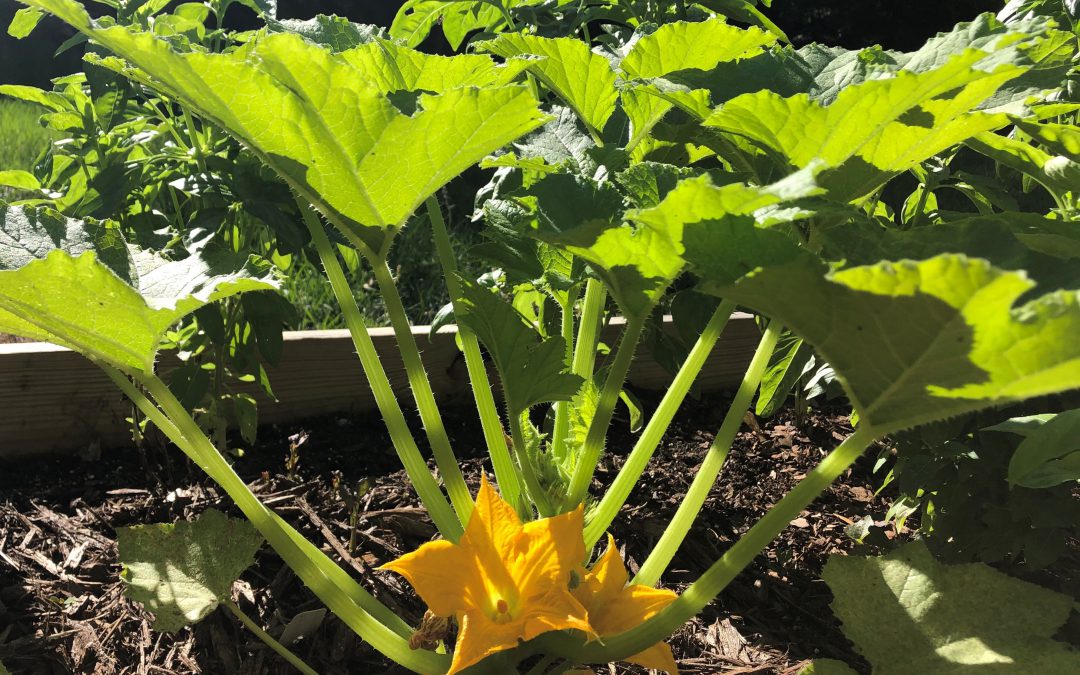
by Molly Jameson | May 7, 2020
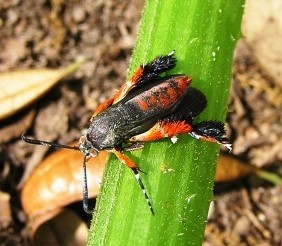
Adult squash vine borer moths are easy to identify, as they are reddish orange and have black dots along their upper abdomen. Photo by Theresa Friday.
It’s been a few weeks, and your squash seedlings are really starting to take off. The days are blushing with summer warmth and the flicker of lightning bugs in the evening indicates the cool nip of spring is winding down. In your garden, this has culminated in lengthening cucurbit stems that now show off a beautiful bright shade of green. Squash blossoms appear overnight and begin to expand and take shape, nestling themselves under the backdrop of slightly darker green squash leaves.
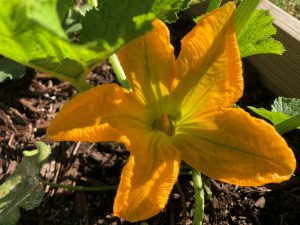
Black beauty zucchini blossom in the morning sun. Photo by Molly Jameson.
A few more nights go by, giving you a chance to explore some recipes. Maybe it’s time to fire up the grill and make grilled summer squash, sprinkled with fresh mint or thyme. Perhaps you’ll make a summer squash pesto pizza. Afterall, your basil is ready for its first harvest. If you are ahead of the game, you might even have some vine-ripening tomatoes that would pair nicely with squash in a creamy pasta sauce.
Your culinary dreams are running wild when you start to notice the wilt. You panic, and think you’ve forgotten to water the garden. But no, you’ve given your garden a consistent dose of water every morning. Your basil looks fine. Your tomatoes look great. What is going on?
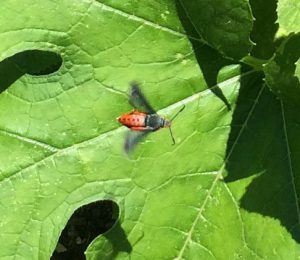
Squash vine borer adult in flight. Photo by Molly Jameson.
You have fallen prey to the dreaded squash vine borer (Melittia cucurbitae).
These garden pests rely strictly on plant species within the genus Cucurbita. If the squash vine borer didn’t wreak such havoc in your summer garden, you might find its striking red and black features fascinating. Unfortunately, if your squash plants are wilting unexpectedly, this daytime roaming moth may have already done its damage.
Adults lay single reddish-brown, millimeter-long eggs on the lower end of the main stem – or on leaves, leaf stalks, fruit buds, or in the soil near the squash plant. Within one to two weeks, larvae hatch, bore into the stem of healthy cucurbits, and begin to chew their way up. Multiple larvae can infect a single plant. This blocks the transport of water and nutrients, leading to the dreadful wilt that often signifies that it is too late.
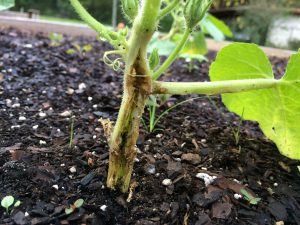
A squash plant severely damaged by squash vine borer larvae. Photo by Molly Jameson.
So, what can be done? Once the wilting has begun, you may be able to reap a small harvest, depending on the timing of infestation. Adult females emerge from cocoons from May to October in Florida and have two generations per season. They prefer cucurbit varieties with large tubular stems, such as yellow squash, zucchini, and pumpkins, but can also infest watermelon and cucumbers.
If you have some cucurbits that do not show signs of infestation but others that are on the decline, it might be worth removing and destroying the infested plants. At the end of the season, cultivate your soil one to two inches deep, as this is where they overwinter in cocoons. Destroying infested plants and cultivation can help reduce the overwintering population.
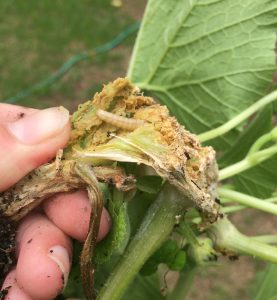
Squash vine borer larvae inside a squash stem. Photo by Molly Jameson.
In North Florida, try seeding squash indoors in March and plant seedlings in the garden in early April. The earlier you plant, the better chance you have of beating the borers. Of course, you must balance the risk of borers with the risk of a late frost.
You may also want to install lightweight floating row covers that can prevent the female from depositing her eggs. But again, it’s a delicate balance, as you do not want to prevent beneficial insects from pollinating your squash once it is producing blossoms.
Scout your plants diligently each day and keep on the lookout for eggs and adults. Adults are attracted to the color yellow, so yellow sticky traps or yellow bowls of water may lure them in. Build up the soil around developing plants to act as a shield against egg laying and boring.
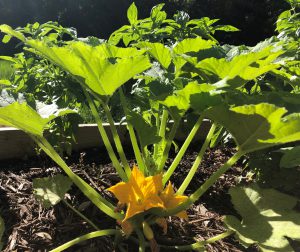
A healthy straightneck squash plant beginning to set fruit. Photo by Molly Jameson.
Once your plants slow their fruit production and you’ve had your fill of grilled squash, squash pizza, and creamy squash pasta, go ahead and remove the plants to prevent late infestations that can then overwinter. Lastly, rotate areas in which you plant cucurbits each year to break borer life cycles.
Vegetable gardening involves innovation and ingenuity. A clever gardener is always striving to balance weather, timing, insects, plants, soil, and everything in between. With a little planning and persistence, I know you can prevail against the tenacious squash vine borer.
For more information about squash vine borers, check out the UF/IFAS EDIS publication, Squash Vine Borer Melittia cucurbitae (https://edis.ifas.ufl.edu/in1068).
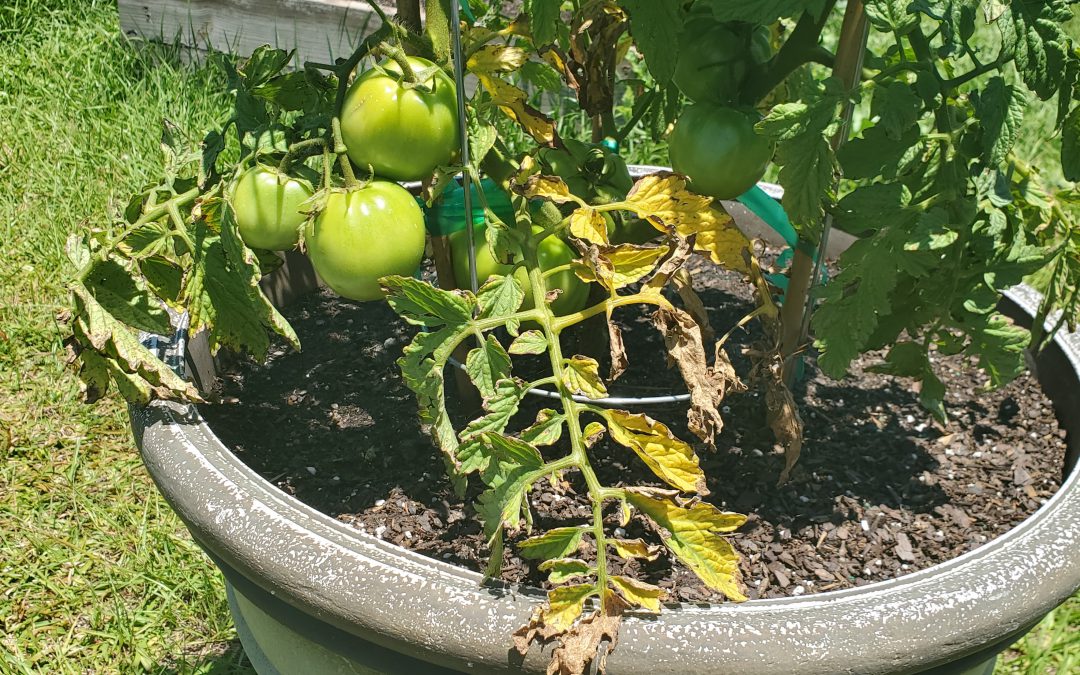
by Daniel J. Leonard | May 7, 2020
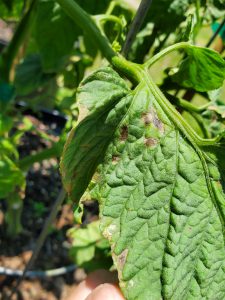
Early BLS symptoms appear on lower leaves. Photo courtesy of the author.
Tomatoes are among the most notoriously difficult vegetable species to grow in Florida. Even when you do everything right (choose disease resistant varieties, buy clean seed/healthy transplants, plant early, rotate crops, scout for insects, prune and support vines, etc), things can go wrong in a hurry. Bacterial Leaf Spot (BLS) caused by the pathogen Xanthomomas perforans, is one of those things. BLS often hitches a ride into gardens undetected on seed and transplants and presents itself as warm and humid weather arrives in late April/early May. Outbreaks typically happen in concurrence with the frequent heavy rainstorms that accompany these months and quickly wreak havoc on tomato plants.
BLS occurrence, much worse in some springs than others, has exploded this year in home gardens. First noticed on the plant’s lower leaves, BLS pathogens enter through natural openings in leaves called stomata, manifest as small, “water-soaked” leaf lesions and then develop within days into dark circular spots, sometimes surrounded by a yellow halo. As conditions worsen, all these individual infections cause a general yellowing or “blighting” of entire leaves. Though the issue begins on tomato leaves, BLS can affect all parts of the plant, including stems, flowers and fruit too! It’s at this point, when blighted leaves become obvious and lesion developing on flower stalks cause both flowers and small fruit to drop, that most home gardeners notice that something is up.
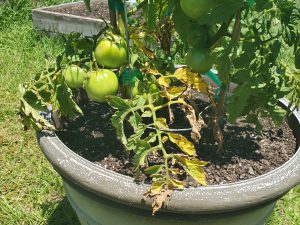
Advancing progression of BLS with “blighted” leaves. Photo courtesy of the author.
Unlike with many other pathogens, gardeners don’t have an abundance of options to control BLS. However, taking the following preventative measures can reduce the pathogen’s impact and stave off disease progression until ripe fruit can be harvested.
- Don’t irrigate overhead. Utilize drip/microirrigation or hand water beds and containers at soil level. This prevents the leaves from becoming wet; wet leaves become a perfect host for BLS.
- Never work tomato plants when leaves are wet. No staking, pruning, tying, or anything else until plant tissue is dry. Working wet tomato plants is an excellent way to spread bacteria!
- Sanitize pruning tools often and wash hands after working infected plants.
- Maintain airflow in plants by planting at correct spacing and thinning interior leaves as necessary to facilitate quicker drying of the plant.
- Prune lower leaves to at least 12” from the soil’s surface to prevent disease transmission from soil to leaves through splashing water.
- Remove infected leaves (when plants are dry!) to slow disease progression.
- Rotate crops and destroy infected plants to prevent buildup of BLS organisms in soil.
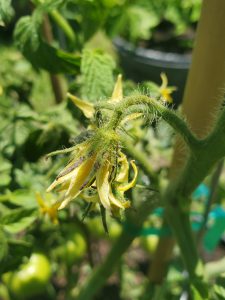
BLS lesions on tomato flowers. Photo courtesy of the author.
- Preventative measures are best, but if your garden has a history of BLS and local weather forecasts call for warm/wet/humid weather, it is best to spray fungicides proactively to protect your crop. A weekly spray with a tank mixture of copper and mancozeb is effective at keeping BLS at bay. This is the only chemical spray combination proven to be effective in controlling BLS.
- Unlike many common tomato pathogens that can be reliably avoided through planting resistant cultivars like ‘Big Beef’, ‘Celebrity’ and others, no varieties are resistant to BLS.
While BLS is an extremely destructive pathogen of both home and commercially grown tomatoes, growers can lessen the disease’s effects by following the preventative measures outlined above and spraying with a copper/mancozeb mix if necessary. Growing tomatoes this year hasn’t been easy, but it’s worth it to fight back and realize a harvest despite difficulties like BLS!
If bacteria have given you the blues or other garden issues are bringing you down, give your local UF/IFAS County Extension Agent a call! We’re here to help you be successful in all your horticultural endeavors. Happy gardening!
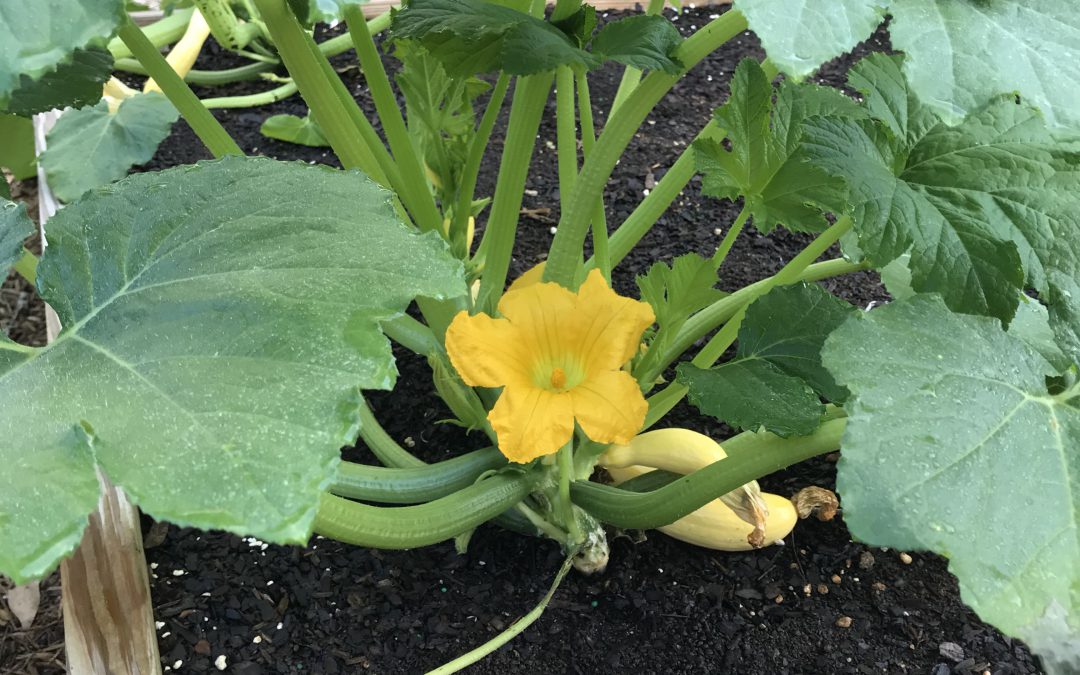
by Daniel J. Leonard | Apr 29, 2020
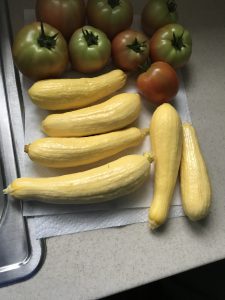
‘Multipik’ fruit. Photo courtesy the author.
Never one to be satisfied growing “standard” vegetable varieties, last year I decided to peruse various seed sources in search of a superior yellow summer squash selection. Plain ‘Yellow Crookneck’ just wasn’t doing it for me anymore. After doing a little research and consulting a friend who works for Johnny’s Selected Seeds, I settled on a straightneck variety called ‘Multipik’.
Developed in the 1980’s by Harris Seed and now sold by many seed purveyors, ‘Multipik’ enjoyed immediate popularity with commercial squash growers due to its many outstanding qualities but curiously, is just making inroads with the home garden market. Even as it is set to celebrate its 30th anniversary next year, two years of personal experience with ‘Multipik’ verify several important characteristics making it a superior choice to many other traditional summer squash varieties: earliness/heavy yields and a precocious gene.
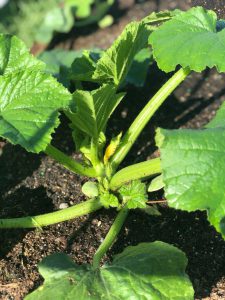
Newly developing ‘Multipik’ fruit. 4 weeks after planting. Photo courtesy the author.
The longer I garden, the more I’m convinced that earliness to maturity is directly related to yield potential in home gardens, especially in the Panhandle. Lots of varieties have high yield potential but that potential is often at least partially wasted here due to the length of time from seed to harvest. Ideally, you could plant, grow a crop and be done by mid-late June, before intense heat, humidity and all the wonderful garden pests and diseases arrive to destroy spring gardens. Maturing just 50 days from planting, ‘Multipik’ beats that deadline (when planted on time in late March) and yields heavily for at least a month before succumbing to the harsh Panhandle summer. Many traditional summer squash varieties, including ‘Yellow Crookneck’ mature 8-14 days later. While 8-14 days doesn’t sound like much, it can mean a major yield difference when factoring in the almost certain late season pests, diseases, and adverse weather conditions.
The next major advantage ‘Multipik’ offers is a precocious gene, meaning that it will mask symptoms and maintain its yellow color if infected with either Watermelon Mosaic Virus (WMV) or Cucumber Mosaic Virus (CMV), two destructive pathogens commonly affecting squash by discoloring fruit and reducing yield. This trait is critical to commercial growers because yellow squash that isn’t yellow isn’t marketable and is important to home gardeners too as a means to eke out higher yields under virus pressure. While the precocious gene isn’t a cure for either virus, it can help hold them at bay while you harvest! Another quirk caused by the precocious gene is the all-yellow appearance of the fruit, from the peduncle (the stalk holding the fruit to the plant) to the apex! From one end of the fruit to the other, Multipik ensures that when you plant yellow squash, you harvest yellow squash.
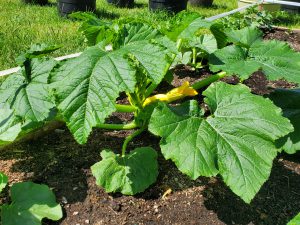
‘Multipik’ just days from harvest. Photo courtesy the author.
Whether you are trying to avoid yield loss from late season insect and disease pressure plaguing your traditional squash plantings or just want to try something a little different, I highly recommend planting ‘Multipik’ Squash. This early, disease-resistant cultivar with delicious medium sized, light yellow fruit is sure to be a hit in both in the garden and on the table. As always, if you have any questions about vegetable gardening or any other horticultural topic, give your local UF/IFAS County Extension Office a call! Happy gardening!

by Larry Williams | Apr 29, 2020
In times like these, it seems that our own perceived “problems” pale in comparison to the “big picture.” In my day-to-day work, I have the opportunity to help people solve problems with their landscapes, lawns and gardens. I enjoy the problem solving part of my job as an extension agent.
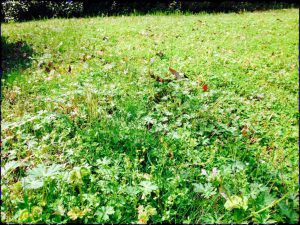
Winter annual weeds in lawn in early spring. Photo credit: Larry Williams
You’d be surprised how upset some people can be about a few weeds, a dying petunia or a tomato with a crack in it. They’ll let small things like this upset their entire world. It’s as if they think we live in a perfect world when it comes to expectations for the plants in their own landscape.
It has become apparent to me that too many people spend too much time letting too many small things bother them too much.
When my twin sister, Linda, and I were growing up in a small town in middle Georgia, an elderly couple (Mr. and Mrs. Hunt) would crack pecans and give the shelled halves to us to eat. They’d hand the shelled pecans to us over the fence that separated our yards. At five or six years old this was a treat for my sister and me.
I remember their landscape. I remember Mrs. Hunt sweeping their dirt driveway lined with coconut sized rocks. She used handmade brooms. I remember their pink flowering dogwoods in spring. I remember their old-fashioned yellow and orange daylilies during summer. I remember the fascination of seeing red spider lilies seemingly come from nowhere in the fall underneath deciduous trees as they displayed their autumn colors. I remember Mrs. Hunt letting me smell a flower from a sweetshrub plant, which reminded me of sweet apples. The deep red blooms and dark green leaves of this shrub complemented the white wooden wall on the east side of their home.
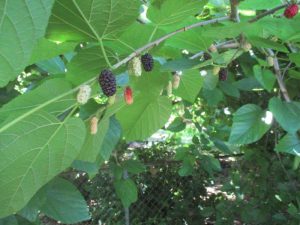
Mulberry tree with fruit. Photo credit: Larry Williams
I remember climbing a large mulberry tree in their backyard and picking and eating the berries. I remember watching Mr. Hunt prune grapevines growing on an overhead trellis. I remember learning about the history of a ginkgo tree planted just outside a chicken pin in their side yard. I remember watching hummingbirds flying in and out of the reddish orange funnel-shaped blooms of a large trumpet vine growing on an old metal frame of a water tank.
I don’t remember the weeds, even though I know there must have been weeds in the Hunt’s landscape. I know there was the occasional pecan that didn’t fill out or that was worm infested. And I’m sure an occasional plant had to be replaced. But these are not the things that made lasting impressions for me.
The big picture is not the weeds, the dying petunia plant or the pecan with a worm in it. Sure you will have weeds in your yard and certain plants that don’t survive. Just don’t let these things become the source of worry. In my opinion, a landscape should be a source of pleasure, a place to learn and a place to pass along lasting memories. Besides, with all the things there are to worry about in this world (as recent days have revealed), why let your own backyard be one of them?
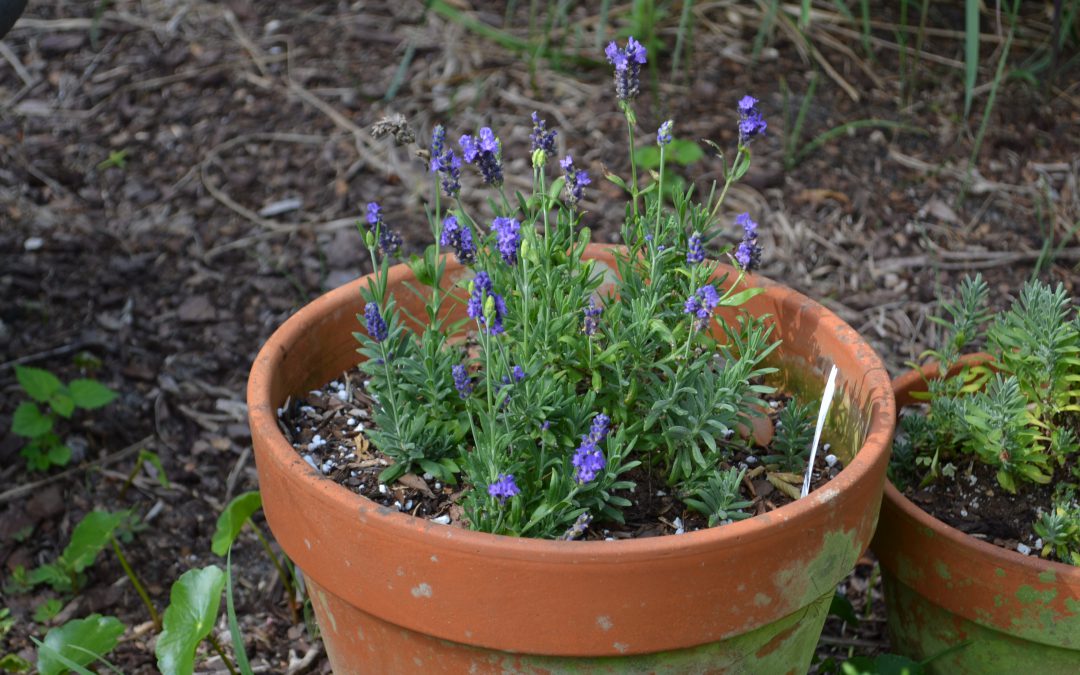
by Beth Bolles | Apr 29, 2020
Escambia County Master Gardener Volunteer Carol Perryman shares information to help choose and grow lavender in the herb garden.
If you want to grow lavender in our hot & humid climate you must follow a few considerations which can be “do or die” rules. Will your lavender be an annual or a perennial? Hybridizers are always busy at work but, in the meantime:
Choose the right variety. (English lavender cannot easily be grown in our climate.)
1.Spanish Lavender- Lavandula stoechas- 18 to 24” tall, lighter scent, early bloomer & long blooming, drought & heat tolerant, good for mild winters, gray/green foliage, magenta-pink flowers with purple bract shaped like a pineapple with bunny ears.
2.’Goodwin Greek Gray’ Lavandula dentata x L. lanata – 2 to 3 feet tall & wide, silvery/gray toothed edged leaves, short spikes of deep purple to blue blooms, heat & humidity tolerant, good to 15 degrees F in winter,
3.French Lavender- Lavandula dentata -3 feet tall, lighter scent, summer bloomer & long blooming, heat tolerant (Protect from frost.), narrow gray & green leaf varieties, “dented” lavender colored flower buds that make up flower head/bract.
4. Sweet Lavender- Lavandula heterophylla – Tolerant of heat & humidity & cold tolerant to 15 degrees F. 1 1/2 to 2 feet tall, gray/green leaves &bright lavender flowers. Allow to dry between watering.
5. ‘Phenomenal’ Lavandula x intermedia – This is a newer evergreen hybrid developed for extreme heat or cold. It is disease resistant, tolerates our humidity, 24” x 32” high & wide with blue to purple blooms and gray/green leaves.
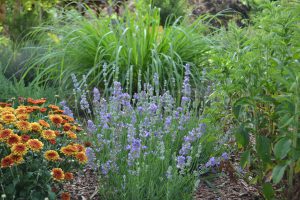
Lavender in the Escambia County Extension herb garden. Photo by Beth Bolles, UF IFAS Extension Escambia County.
Choose your site well or consider growing in pots.
1. LIGHT – Full sun.
2. DRAINAGE – Focus on drainage. MUST be well-draining site or pot or modified to be so.
3. SOIL – Loose almost neutral soil.
4. AIRFLOW – Focus on air circulation which will help dry off the leaves after rain. Space appropriately.
5. WATER – Focus on water source. Lavender does not like to be watered overhead. A dripline
is best or water by hand around roots, not on leaves. Check water requirements for your chosen variety.
6. MULCH- Whether in the ground or in pots, use light-colored gravel or small rocks as mulch
to help reflect sunlight & heat to help keep foliage dry. Heat & light reflected off a nearby brick, stone, or stucco wall, help keep foliage dry too.
7. ACCESS- Must be able to deadhead & prune. Lavender only blooms on new growth. In our climate it should be pruned back about 1/3 of it’s height & shaped to keep the mound-like shape in early January unless we have an extremely cold winter. If so, then early spring. You can prune lightly after deadheading spent blooms to promote new growth throughout bloom season. Add 1 inch of composted materials around plant each spring or lightly fertilize with slow time-release fertilizer. Do not over fertilize. Lavender doesn’t need much fertilizer.
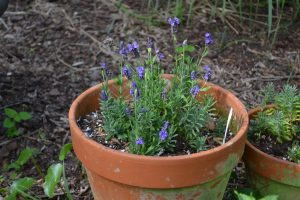
Lavender may grow best for you in a container. Photo by Beth Bolles, UF IFAS Extension Escambia County.
If you are new at growing lavender, try pots. You could try several varieties in different locations to better understand which conditions & locations will work best in your garden. The beauty of pots is their portability. If one location doesn’t work, you can move the pot.
All lavender is edible. You can use the leaves or flowers, fresh or dried. Fragrant lavender is a wonderful addition to your garden although in our climate, most lavenders are not going to be long lived. If you have found “the spot” in your own little microclimate & your lavender thrives year after year, consider yourself lucky.
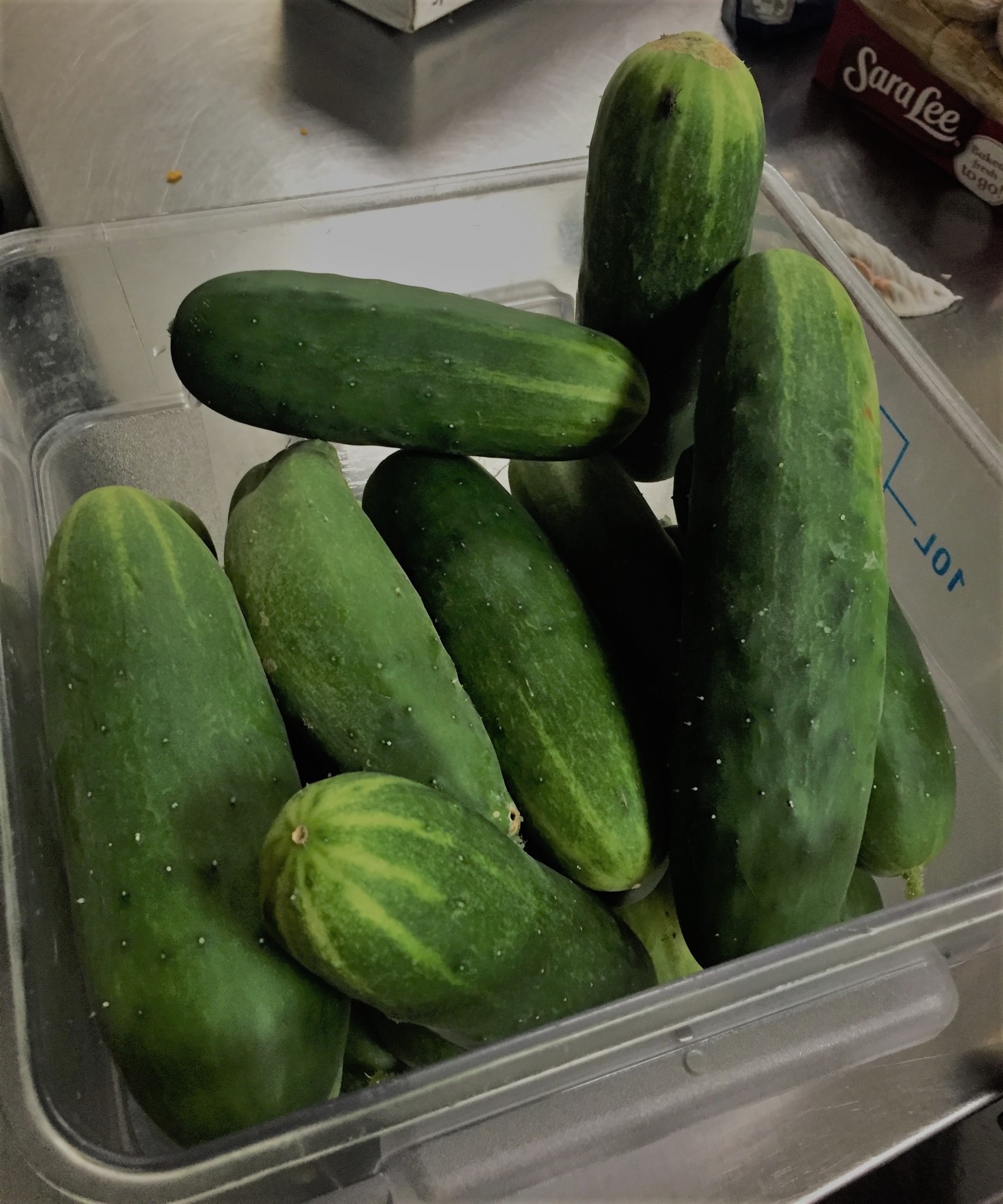
by Beth Bolles | Apr 23, 2020
Cucumbers are a favorite fruit of many gardeners and with a little routine care, you can harvest fresh fruit from your own home garden. Learn some basic information about starting your own cucumbers In the Backyard Garden with UF IFAS Extension Escambia County.






















